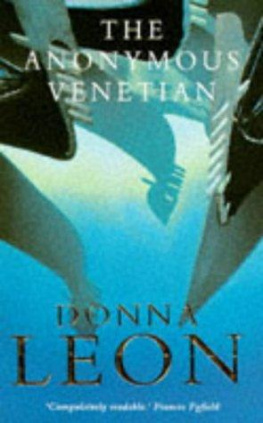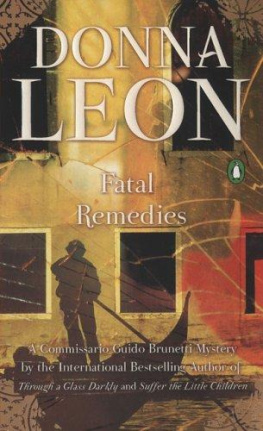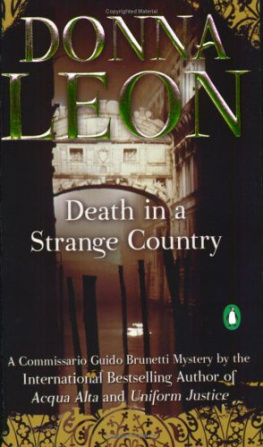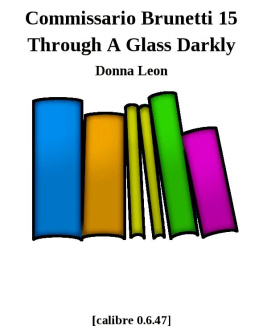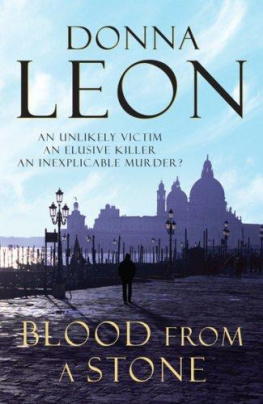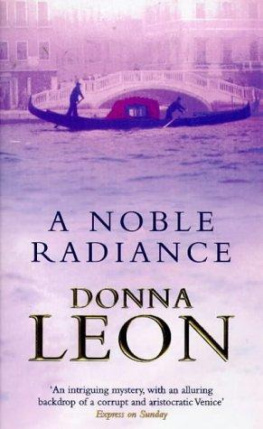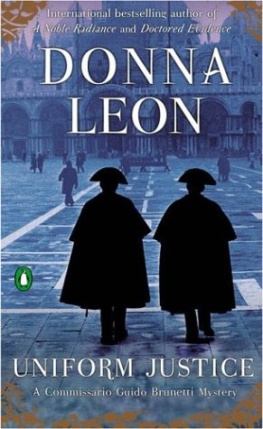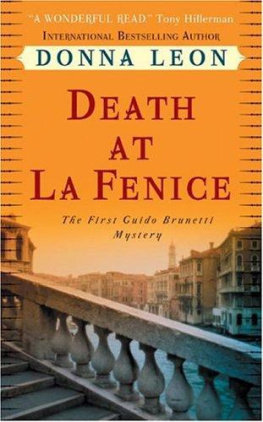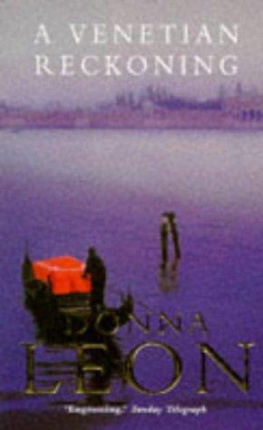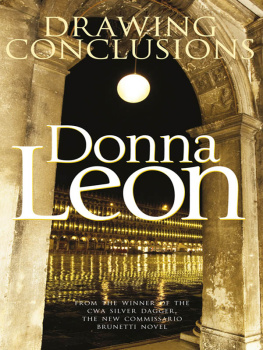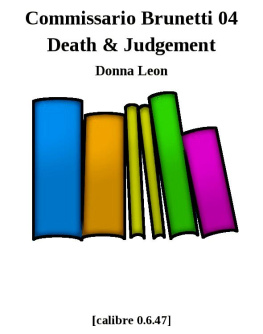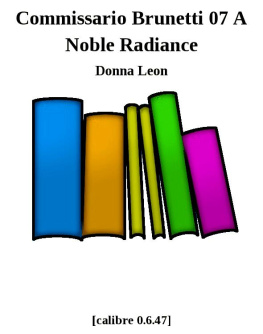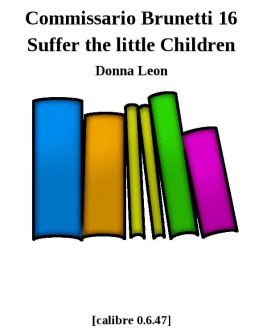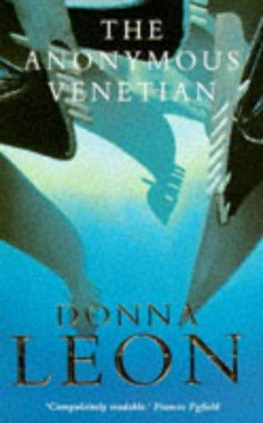* * * *
Anonymous Venetian
[Commissario Brunetti03]
By Dona Leon
Scanned &Proofed By MadMaxAU
* ** *
Ahforse adesso
Sulmorir mio delusa
Privadogni speranza, e di consiglio
Lagrimedi dolor versa dal ciglio.
Ah,perhaps already
Deceivedby my death
Deprivedof every hope and counsel
Tearsof pain flow from her eyes.
Mozart,Lucio Silla
* * * *
Chapter One
Theshoe was red, the red of London phone booths, New York fire engines, althoughthese were not images that came to the man who first saw the shoe. He thoughtof the red of the Ferrari Testarossa on the calendar in the butchers showers,the one with the naked blonde draped across it, seeming to make fevered love tothe left headlight. He saw the shoe lying drunkenly on its side, its toe barelytouching the edge of one of the pools of oil that lay like a spotted curse uponthe land beyond the abattoir. He saw it there and, of course, he also thoughtof blood.
Somehow, years before, permissionhad been given to put the slaughterhouse there, long before Marghera hadblossomed, though that is perhaps an inopportune choice of verb, into one ofthe leading industrial centres of Italy, before the petroleum refineries andthe chemical plants had spread themselves across the acres of swampy land thatlay on the other side of the laguna from Venice, pearl of the Adriatic.The cement building lay, low and feral, within the enclosure of a high meshfence. Had the fence been built in the early days, when sheep and cattle couldstill be herded down dusty roads towards the building? Was its original purposeto keep them from escaping before they were led, pushed, beaten up the ramptowards their fate? The animals arrived in trucks now, trucks which backeddirectly to the high-sided ramps, and so there was no chance that they couldescape. And surely no one would want to come near that building; hence thefence was hardly necessary to keep them away. Perhaps because of this, the longgaps in it went unmended, and stray dogs, drawn by the stench of what went oninside, sometimes came through the fence at night and howled with longing forwhat they knew was there.
The fields around theslaughterhouse stood empty; as if obeying a taboo as deep as blood itself, thefactories stood far off from the low cement building. The buildings maintainedtheir distance, but their ooze and their runoff and those deadly fluids thatwere piped into the ground knew nothing of taboo and seeped each year closer tothe slaughterhouse. Black slime bubbled up around the stems of marsh grass, anda peacock-bright sheen of oil floated on the surface of the puddles that neverdisappeared, however dry the season. Nature had been poisoned here, outside,yet it was the work that went on inside that filled people with horror.
The shoe, the red shoe, lay onits side about a hundred metres to the rear of the slaughterhouse, just outsidethe fence, just to the left of a large clump of tall seagrass that seemed tothrive on the poisons that percolated around its roots. At eleven-thirty on ahot Monday morning in August, a thickset man in a blood-soaked leather apronflung back the metal door at the rear of the slaughterhouse and emerged intothe pounding sun. From behind him swept waves of heat, stench, and howls. Thesun made it difficult to feel that it was cooler here, but at least the stenchof offal was less foul, and the sounds came from the hum of traffic, akilometre away, as the tourists poured into Venice for Ferragosto, not from theshrieks and squeals that filled the air behind him.
He wiped a bloody hand on hisapron, stooping to find a dry spot down by the hem, then reached into his shirtpocket and pulled out a package of Nazionale. With a plastic lighter, he litthe cigarette and pulled at it greedily, glad of the smell and acrid taste ofthe cheap tobacco. A deep-throated howl came from the door behind him, pushinghim away from the building, over towards the fence and the shade that was to befound under the stunted leaves of an acacia that had managed to grow to a heightof four metres.
Standing there, he turned hisback on the building and looked out across the forest of smokestacks andindustrial chimneys that swept off towards Mestre. Flames spurted up from someof them; grey, greenish clouds spilled out of others. A light breeze, too weakto be felt on his skin, brought the clouds back towards him. He pulled at hiscigarette and looked down at his feet, always careful, here in the fields,where he stepped. He looked down and saw the shoe, lying on its side beyond thefence.
It was made out of some sort ofcloth, that shoe, not out of leather. Silk? Satin? Bettino Cola didnt knowthat sort of thing, but he did know that his wife had a pair made out of thesame sort of stuff, and she had spent more than a hundred thousand lire onthem. Hed have to kill fifty sheep or twenty calves to earn that much money,yet shed spend it on a pair of shoes, wear them once, then stuff them in theback of the closet and never look at them again.
Nothing else in the blastedlandscape deserved his attention, so he studied the shoe, pulling at hiscigarette. He moved to the left and looked at it from another angle. Though itlay close to a large pool of oil, it appeared to rest on a patch of dry land.Cola took another step to the left, one that drew him out into the fullviolence of the sun, and studied the area around the shoe, looking for itsmate. There, under the clump of grass, he saw an oblong shape that seemed to bethe sole of the other one, it too lying on one side.
He dropped his cigarette andcrushed it into the soft earth with his toe, walked down the fence a fewmetres, then bent low and crept through a large hole, careful of the jagged,rusty barbs of metal that encircled him. Straightening up, he walked backtowards the shoe, now a pair of them and perhaps salvageable because of that.
Roba di puttana , he muttered under his breath,seeing the heel on the first shoe, taller than the pack of cigarettes in hispocket: only a whore would wear such things. He reached down and picked up thefirst shoe, careful to keep from touching the outside. As he had hoped, it wasclean, had not fallen into the oily puddle. He took a few steps to the right,reached down and wrapped two fingers around the heel of its mate, but itappeared to be caught on a tuft of grass. He lowered himself to one knee,careful to see where he knelt, and gave the shoe a sharp tug. It came loose,but when Bettino Cola saw that what he had pulled it loose from was a humanfoot, he leaped back from the bush and dropped the first shoe into the blackpuddle from which it had survived the night.
* * * *
Chapter Two
Thepolice arrived on the scene twenty minutes later, two blue and white sedansfrom the Squadra Mobile of Mestre. By then, the field at the back of theslaughterhouse was filled with men from inside the building, brought out intothe sun by curiosity about this different kind of slaughter. Cola had rundrunkenly back inside as soon as he saw the foot and the leg to which it wasattached and gone into the foremans office to tell him there was a dead womanin the field beyond the fence.
Cola was a good worker, a seriousman, and so the foreman believed him and called the police immediately withoutgoing outside himself to check and see that Cola was telling the truth. Butothers had seen Cola come into the building and came to ask what it was, whathad he seen? The foreman snarled at them to get back to work: the refrigeratedtrucks were waiting at the loading docks, and they didnt have time to stand aroundall day and gabble about some whore who got her throat cut.
He didnt mean this literally, ofcourse, for Cola had told him only about the shoe and the foot, but the fieldsbetween the factories were well-known territory to the men who worked in the factories- and to the women who worked in those fields. If shed got herself killedthere, then she was probably one of those painted wrecks who spent the lateafternoon standing at the side of the road that led from the industrial zoneback into Mestre. Quitting time, time to go home, but why not a quick stop atthe side of the road and a short walk back to a blanket spread beside a clumpof grass? It was quick, they expected nothing of you except ten thousand lire,and they were, more and more often now, blondes come in from Eastern Europe, sopoor that they couldnt make you use anything, not like the Italian girls onVia Cappuccina, and since when did a whore tell a man what to do or where toput it? She probably did that, got pushy, and the man had pushed back. Plentymore of them and plenty more coming across the border every month.

